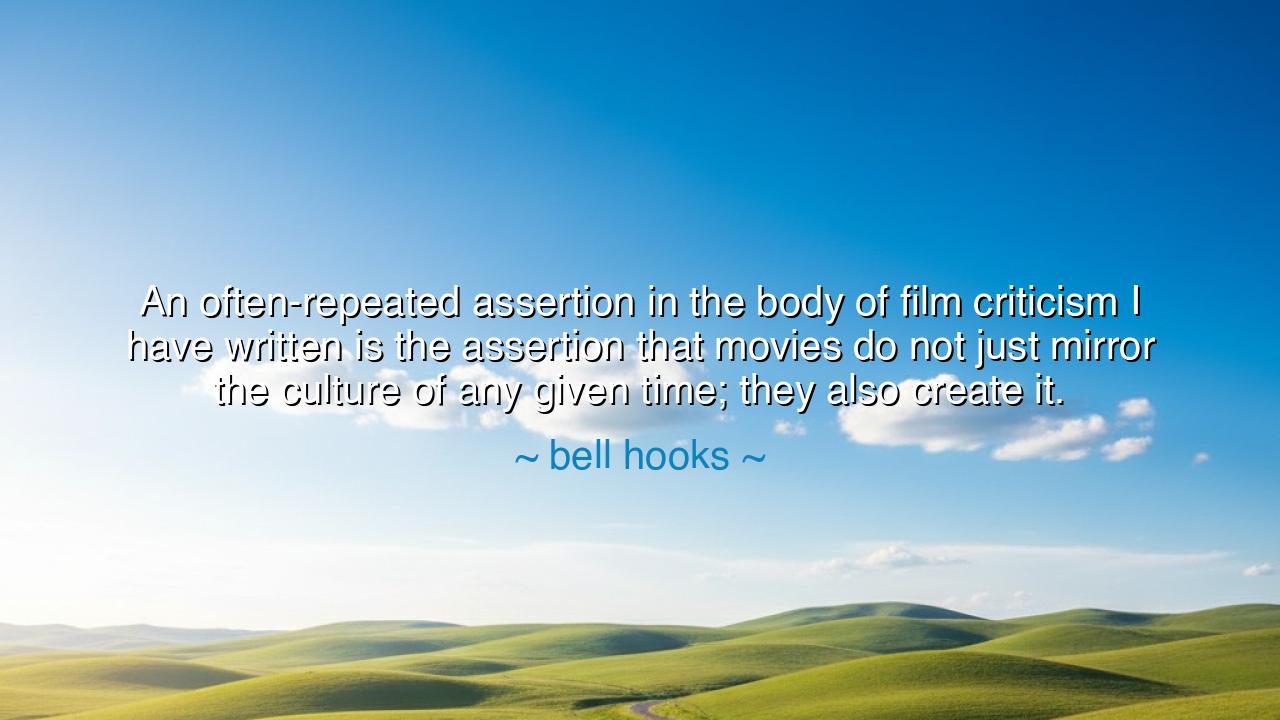
An often-repeated assertion in the body of film criticism I have
An often-repeated assertion in the body of film criticism I have written is the assertion that movies do not just mirror the culture of any given time; they also create it.






When bell hooks declared, “An often-repeated assertion in the body of film criticism I have written is the assertion that movies do not just mirror the culture of any given time; they also create it,” she spoke with the voice of a seer who perceives the hidden currents of society. For many believe that movies are but reflections, shadows of life cast upon the screen, harmless echoes of what already exists. But hooks, with the wisdom of one who studied both art and power, knew the deeper truth: that cinema is not only a mirror but a forge, shaping the very culture it seems merely to portray.
The mirror deceives because it appears passive. When we gaze upon it, we think it simply shows what already is. Yet film, unlike glass, does not merely reflect—it selects, arranges, and magnifies. It tells us which lives are worthy of being seen, which bodies are beautiful, which voices are heard, which stories are noble. And from these choices, whole generations learn to love, to hate, to desire, and to fear. What seems to be a mere reflection is, in truth, a lesson carved into the collective imagination.
Consider the tale of D.W. Griffith’s The Birth of a Nation, that infamous film of the early 20th century. It claimed to depict history, to mirror the aftermath of the Civil War, but in its false images it planted poisonous seeds. It glorified the Ku Klux Klan, dehumanized Black Americans, and helped to revive racial terror in the United States. Here we see hooks’ truth made plain: the movie did not only show culture—it created it, giving new life to hatred through the glamour of the screen.
Yet cinema can also create in the opposite direction, as a force for liberation. Think of The Battle of Algiers, Gillo Pontecorvo’s masterpiece, which did not merely depict colonial struggle but awakened revolutionary consciousness across the world. It was studied not only by artists but by freedom fighters, who saw in its frames the strategies of resistance. In such films, the screen is no longer a mirror but a fire, igniting courage in those who watch.
Thus, hooks teaches us to respect the power of movies. They are not idle distractions, but instruments that mold culture itself. They teach children what to dream, lovers how to imagine romance, nations what to fear, and societies whom to honor or despise. To watch thoughtlessly is to drink deeply of unseen influence, to be shaped without knowing by the hand of another. To watch critically is to guard the soul, to recognize not only the reflection but the creation at work within the film.
The lesson, O seekers, is to open your eyes. Do not treat movies as mere entertainment, but as teachers—sometimes good, sometimes corrupt. Ask of every film: what vision of the world does it show me? What kind of future does it seek to create? And then choose carefully which visions you allow to enter your heart. For to watch is also to participate in the shaping of culture itself.
Practical action lies in this: support films that uplift, that broaden the boundaries of humanity, that honor voices silenced by history. Resist the seduction of those that glorify cruelty or diminish the dignity of others. Teach children to question what they see, so they may become not passive mirrors of false culture but active creators of a just one. For if movies create culture, then by our choices as viewers, we shape the culture that will rise.
Therefore, let bell hooks’ words remain as both warning and promise: cinema is never neutral. It is both mirror and maker, both reflection and creation. To know this is to gain power; to ignore it is to be ruled by illusions. Let us then watch with wisdom, create with conscience, and carry forward stories that build a culture worthy of love, justice, and truth.






AAdministratorAdministrator
Welcome, honored guests. Please leave a comment, we will respond soon